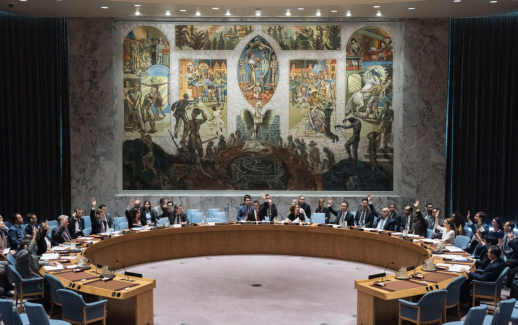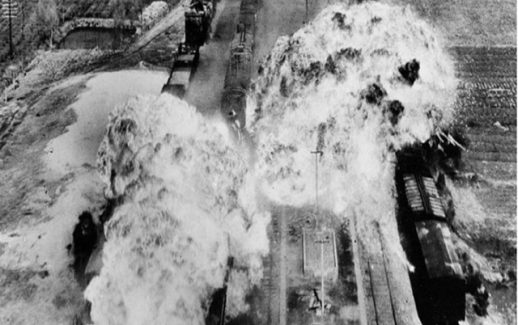Russia’s Ties to Blasts in Czech Republic, Ukraine and Recommendations
Recent History is Instructive: Massive explosions in two democracies in the past seven years suggest Russian sabotage, state terror, and military operations against sovereign neighboring and nearby states, including: (1) the Czech Republic at an ammunition depot outside Prague on Oct. 16, 2014; (2) and multiple explosions at Ukrainian ammunition depots between 2015 and 2018 including massive multi-day events at the Balakleya ammunition depot on March 2017; the Kalynivka, Ukraine ammunition depot on September 26-27, 2017, and another near Druzhba, Ukraine on October 7-8, 2018.
Some video documentaries and discussions of the tactically-significant ammo depot explosions in the Czech Republic and Ukraine follow:
Czech Republic Ammunition Depot Explosion, October 16, 2014
Balakleya, Ukraine, Ammo Depot Explosion, March 2017
Kalynivka, near Vinnytsia, Ukraine, September 2017
Druzhba, Chernihiv Region, Ukraine, October 2018
Contextual, Tactical Implications:
The fires, massive explosions, and stray missile activity at the ammo depots in the Czech Republic in 2014 and in Ukraine between 2015-2018 destroyed large stores of shells, rockets, and missiles held by or destined for the Ukrainian military. Some of the depots reportedly contained older munitions and were not well manned.
In the context of the rapid Russian military buildup and Spring offensive feint at Ukraine’s border in the month of April 2021, such tactical sabotage operations align with Russian military objectives to degrade the Ukraine military’s readiness, lethality, and morale. This series of degradations of Ukrainian military resources would also benefit Putin’s Russian nationalist, irredentist, revanchist, and mercenary fighters in Ukraine.
Czech Republic Prime Minister Andrej Babis cited “unequivocal evidence” linking the intelligence unit of two infamous GRU foot soldiers to a fire and powerful explosion at an ammunition depot near Prague on October 16, 2014. The Czech depot reportedly contained weapons destined for delivery to the Ukraine military.
In December 2020, Russian President Vladimir Putin told Russian journalists that he would increase aid to the areas supporting Russian speaking insurgents and irredentist forces in Ukraine, suggesting that the seemingly innocuous expression of intent to help the “people” in the Donbas may have signaled a higher aggression posture preparing for this month’s staged invasion force.
Basic Recommendations
(1) Ukraine, European, and Eurasian democracies must harden facilities storing munitions, heavy weaponry, light weaponry, aircraft, energy, fuel, chemical, and other material supply chains against insider threats, covert attacks, and clandestine sabotage;
(2) When hacking surveillance and reconnaissance activity increases, implement extra physical security and vigilance at military bases, depots, throughout the supply chain, armories, and related sites. This should include insider checks, K9 bomb detection patrols, and unannounced inspections;
(3) Assemble and train special base, depot, supply chain, storage and armory security units with combat and technical experience and capability, and assign them to prioritized installations;
(4) Assemble and train rapid materiel removal and temporary storage teams for special circumstances;
(5) Decentralize ammunition, munition, weapons, heavy weapons, and other military supplies so that they are movable, changeable, and support a range of Ukrainian military positions and capabilities focusing on preserving stocks and providing for continuous supply, resupply, and replenishment;
(6) Build-up communications monitoring and decrypting capabilities;
(7) Create anti-drone buffer zones surrounding all military supply chain sites, barracks, stations, depots, and communications facilities;
(8) Apply faraday protection for critical circuitry, communication areas, and other operational spaces relied upon by Ukrainian command, control, and communications;
(9) Create inspection checklists and inspection teams for insuring the maintenance, training, vetting, and execution desired. Utilize snap inspections as motivation and as a countermeasure opportunity where available;
(10) Identify Russian and proxy hackers used to support or execute sabotage. Eliminate the means, anonymity, and secrecy by which they operate;
(11) Seek detente via diplomacy while bringing Russian sabotage activity before the U.N. and other international bodies, especially when such aggression results in loss of human life, economic opportunity, violates nation state sovereignty, and causes related instability in the region.
Conclusion
The defense force that handles military materiel, supply chains, munitions, weapons, and communications in lax, non-serious, and wasteful ways is self-defeating.

